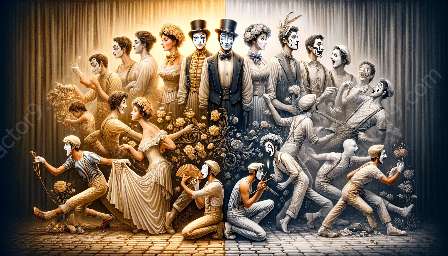Mimicry performance is an art form that combines psychological, physical, and emotional elements. Understanding the psychological factors that contribute to a successful mimicry performance is essential for any performer looking to excel in the art of mimicry, mime, and physical comedy.
Psychological Factors in Mimicry Performance
Successful mimicry performance involves more than just imitating vocal and physical traits. It requires an in-depth understanding of various psychological factors that influence both the performer and the audience.
Empathy and Observation
Empathy plays a crucial role in mimicry performance. A successful mimic is able to observe and understand the emotions, behaviors, and mannerisms of their subject. This requires keen observation skills and the ability to empathize with the person being mimicked, allowing the performer to accurately portray their subject's psychological state.
Adaptability and Flexibility
Performers must be psychologically flexible and adaptable to effectively mimic a wide range of personalities and characters. This requires the ability to quickly shift between psychological states, adopt different mindsets, and embody diverse personalities in a convincing and authentic manner.
Psychological Resilience
Performance anxiety and psychological pressure are common challenges for mimicry performers. Psychological resilience, the ability to cope with stress and perform under pressure, is essential for maintaining a successful mimicry performance. Overcoming stage fright and maintaining psychological composure are crucial for delivering a flawless performance.
The Art of Mimicry, Mime, and Physical Comedy
Mimicry is closely related to mime and physical comedy, as all three art forms require a deep understanding of psychological and physical dynamics. Mime, known for its use of body movements and facial expressions to convey emotions and actions, relies heavily on psychological interpretation and portrayal. Similarly, physical comedy blends elements of humor, timing, and psychological insight to deliver comedic performances that resonate with audiences.
Psychological Depth in Mimicry, Mime, and Physical Comedy
Successful artists in mimicry, mime, and physical comedy delve into the psychological aspects of their performances to create engaging, relatable, and authentic experiences for their audiences. This involves understanding psychological nuances, emotional states, and behavioral cues to deliver impactful and memorable performances.
Connection with the Audience
Psychological factors play a pivotal role in establishing a strong connection between performers and their audience. Mimicry, mime, and physical comedy artists use psychological insights to captivate and engage their viewers, fostering emotional responses and creating memorable experiences that transcend language barriers.
Conclusion
The art of mimicry, mime, and physical comedy is deeply rooted in psychological factors that contribute to successful performance. By understanding and leveraging these psychological elements, performers can elevate their craft and deliver captivating, authentic, and impactful performances that resonate with audiences on a profound level.


























